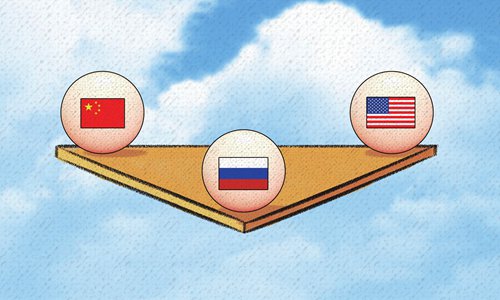HOME >> OPINION
US-Russia relations reset will not come easily
By Cui Heng Source:Global Times Published: 2019/5/22 18:48:40

Illustration: Liu Rui/GT
After Chinese State Councilor and Foreign Minister Wang Yi met with Russian Foreign Minister Sergei Lavrov in the Russian city of Sochi on May 13, Wang announced in a joint press conference that Chinese President Xi Jinping would visit Russia in June. The following day, Russian President Vladimir Putin met with US Secretary of State Mike Pompeo, expressing willingness to resume bilateral relations with the US. Amid the escalating China-US trade war, the game and interaction between big powers provide food for thought on today's international configuration.
China, the US, and Russia represent a triangle game that is not outdated. Any change in bilateral relations among the three powers will influence others. It's believed that Russia was no longer a super power with global influence. However, considering Russia's political and military power as well as its geopolitical clout, it is still an influential country. After the Ukraine crisis, Russia suffered a prolonged economic slump under the collective pressure of Western countries. But Moscow increased momentum and gained a favorable position in the Middle East, which the country did not have during the Cold War. Underestimating Russia's role would be a bad judgment call.
When China and the US have conflicts, Russian diplomatic maneuvers would alert concern within the international community. However, the belief that the Sino-US conflict will bring about a better US-Russia relationship is no different from treating the interactions of today's major powers with the outdated Cold War mentality, thus ignoring three decades of significant change.
The US-Russia relationship has experienced ups and downs since the end of the Cold War. During the Obama era, the US tried to smooth ties with Russia, which ended up with the bilateral relationship entering into a state of new cold war after the Ukraine crisis. In such context, Russians no longer believe they can be accepted as an equal member by Western countries.
During the Obama era, some Russians might have expected a reset of Russia-US relations. But Russian elites do not believe relations could start over under the Trump administration. The meeting between Putin and Pompeo was merely a manifestation of the political big-power game. The US and Russia need to use one another to increase leverage on the international stage. It's too early to say if their relationship could break the ice. Structural contradictions between both sides will not be easy to resolve in the short run. The Ukraine issue, in particular, has always been an obstacle. Besides, strategic trust is lacked between the US and Russia. Under the Trump administration, the US elites have increasingly viewed Russia from the ideological perspective. Likewise, anti-American sentiment has occupied a place within Russian diplomatic thinking. Pompeo's intent to drive a wedge in China-Russia relations should not be ignored. For instance, he has given special attention to common interests between the US and Russia, and tried to cooperate with Russia in areas inconsistent with China's interests.
Since the start of the new century, the China-Russia partnership has functioned at a high level. The relationship was not solely built to deal with common rivals, but because both sides possess similar views on the international order and global conditions.
China and Russia firmly uphold the international system centered on the UN. Both countries agree that unilateralism and "bullyism" practices are unpopular and that cooperation and mutual benefits are the goals pursued by all.
Both China and Russia believe that the main theme of the current era is development, advocating multilateralism and an open world economy, jointly coping with emerging global issues and building a community of common destiny and interests.
The China-Russia relationship is strategically stable and can withstand external interference. Even if US-Russia relations thaw, that will not affect China-Russia ties.
As the total volume of exports and imports between China and Russia exceeded $100 billion in 2018, the two sides are focusing on a $200 billion target. China is becoming increasingly important to Russia's steady development of its economy and society. Russia is very clear about who is the most important strategic partner. President Xi will visit Russia in June and attend the St. Petersburg International Economic Forum, further advancing the progress of China-Russian pragmatic cooperation. Against the backdrop of a China-US trade war, it is not easy to reset US-Russia relations, and China's relationship with Russia will continue to grow stronger.
The author is an assistant of scientific research at the Research Center for Co-development with Neighboring Countries, East China Normal University. opinion@globaltimes.com.cn
Posted in: VIEWPOINT